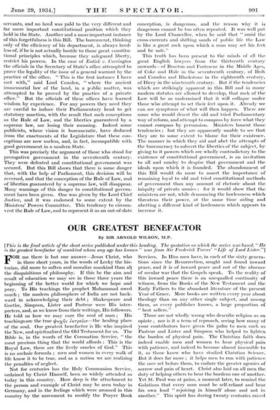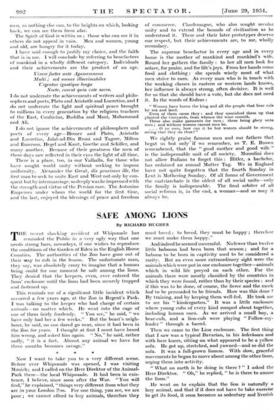OUR GREATEST BENEFACTOR
By SIR ARNOLD WILSON, M.P.
[This is the final article of the short series published under this heading. The quotation on. which the series was based," He is the greatest benefactor of mankind whom any age has known" was from Sir Frederick Treves' "Life of Lord Lister."1 FOR me there is but one answer—Jesus Christ, who in three short years, in the words of Lecky the his- torian, did more to soften and moralize mankind than all the disquisitions of philosophy. If this be the aim and result of education we may see in those three years the beginning of the better world for which we hope and pray. To His teachings the prophet Muhammad owed much ; the modern philosophers of India are not back- ward, in acknowledging their debt ; Shakespeare and Goethe, Simpson, Lister and Pasteur were His inter- preters, and, as we know from their writings, His followers. He told us how we may cure the soul of man ; His teachings are the true -sfruxi); laT pelov—the healing place of the soul. Our greatest benefactor is He who inspired the New, and spiritualized the Old Testament for us. The Bible is, in the words of the Coronation Service, " the most precious thing that the world affords : This is the Royal Law, these are the lively oracles of God." This is no archaic formula ; men and women in every walk of life know it to be true, and as a nation we are realizing the penalties- of neglect.
Not for centuries has the Holy Communion Service, ordained by-Christ Himself, been so widely attended as today in this country. How deep is the attachment to the person and example of Christ may be seen today in Germany, and in the feelings which were aroused in this country by the movement to modify the Prayer Book Services. In Him men have, in each of the sixty genera- tions since the Resurrection, sought and found inward peace, and it is of inward peace and not of the absence of secular war that the Gospels speak. To the reality of this inward peace there is an unequalled continuity of witness, from the Books of the New Testament and the Early Fathers to the abundant literature of the present Year of Grace. More books are written every year about theology than on any other single subject, and among them, as every publisher knows, a large proportion of " best sellers."
Those are not wholly wrong who describe religion as an opiate ; nor is it a term of reproach, seeing how many of your contributors have given the palm to men such as Pasteur and Lister and Simpson who helped to lighten the burden of physical pain. The Christian faith does indeed enable men and women to bear physical pain with patience, and indeed to become almost insensible to it, as those know who have studied Christian Science. But it does far more ; it helps men to run with patience the race set before them, to endure the greater agonies of sorrow and pain of heart. Christ also laid on all men the duty of helping others to bear the burdens one of another. Yet St. Paul was at pains, a moment later, to remind the Galatians that every man must be self-reliant and bear his own load " rejoicing in himself alone and not in another." This spirit has during twenty centuries raised men, as nothing else can, to the heights on which, looking back, we can see them from afar.
The Spirit of God is within us ; those who can see it in others do not appeal in vain. Men and women, young and old, are hungry for it today.
I have said enough to justify my choice, and the faith- that is in me. I will conclude by referring to benefactors of mankind in a wholly different category. Individuals and their achievements are the product of an age.-
Vixere fortes ante Agamemnona Multi ; sed manes illacrimabiles Urgentur ignotique Tonga Node, carent quia rate sacro.
I do not underrate the achievements of writers and philo- sophers and poets, Plato and Aristotle and Lucretius, and I do not underrate the light and spiritual peace brought to millions in every generation by the religious teachers of the East, Confucius, Buddha and Mani, Muhammad and Ali.
I do not ignore the achievements of philosophers and poets of every age—Homer and Plato, Aristotle and Lucretius, Rumi and Tagore, Milton and Emerson, Hegel and Kant, Goethe and Schiller, and many another. Because of their greatness the men of those days saw reflected in their eyes the light of all time.
There is a place, too, in our Valhalla, for those who have sought world unity without seeking to impose uniformity. Alexander the Great, dis proximus ille, the first man to seek to unite East and West not only by con- quest but by intermarriage, so deeply was he impressed with the strength and virtue of the Persian race. The Antonine Emperors under whom the world for the first time, and the last, enjoyed the blessings of peace and freedom of commerce. Charlemagne, who also sought , secular unity and to extend the bounds of civilization as he understood it. These and their later prototypes deserve our respect, but their achievements are, to me, wholly secondary.
The supreme benefactor in every age and in every home is the mother of -mankind and mankind's wife. Round her gathers the family : to her all men look for solace, for praise, and for life's joys. From her hands come food and clothing : she spends wisely most of what men strive to earn. As every man who is in touch with the working classes in eastern or western lands knows, her influence is always strong, often decisive. It is well for us that she should have a vote, but she does not need it. In the words of Esdras :
" Women have borne the king and all the people that bear rule by sea and land. Even of them came they : and they nourished them up that planted the vineyards, from whence the wine cometh. These also make garments for men ; these bring glory unto men ; and without women cannot men be. . . . 0 ye men, how can it be but women should be strong, seeing that they do thus?"
We rightly praise famous men and our fathers that begat us but only if we remember, as T. E. Brown remembered, that the " good mother and good wife " is the indispensable unit of all society. Mussolini does not allow Italians to forget this : Hitler, a bachelor, has ordained an annual Mutter Tag. We in England have not quite forgotten that the fourth Sunday in Lent is Mothering Sunday. Of all forms of Government the matriarchate is the oldest of all social units—only the family is indispensable. The final arbiter of all social reforms is, in the end, a woman—and so may it always be.





































 Previous page
Previous page